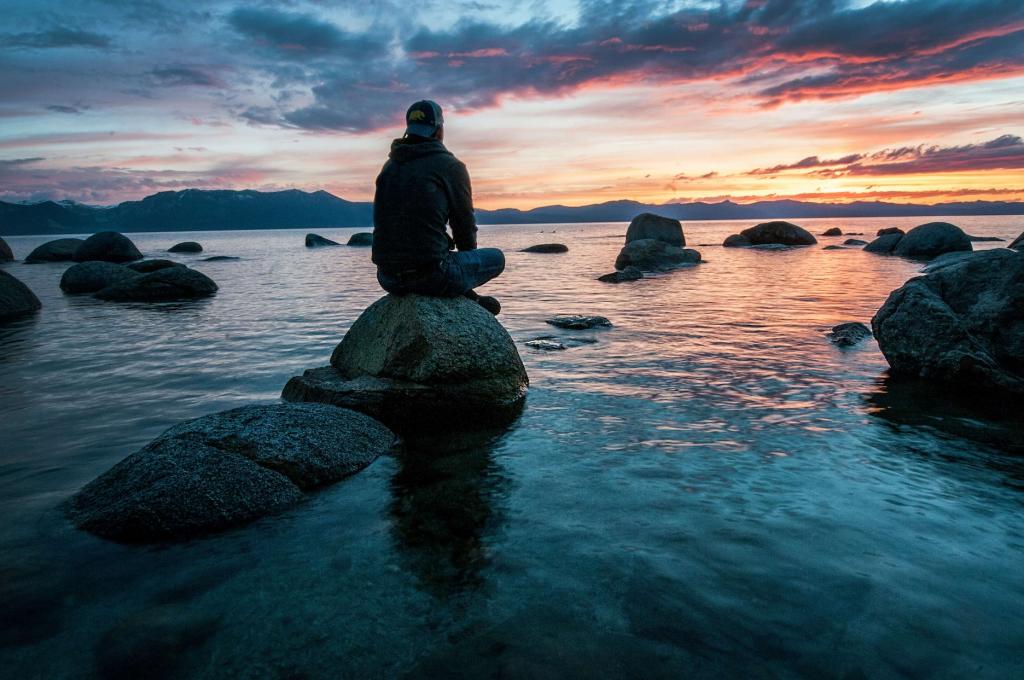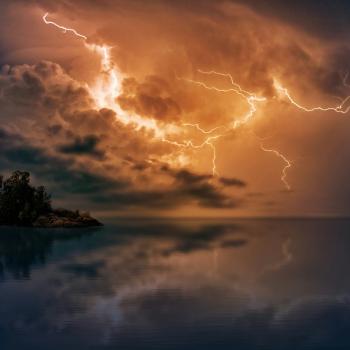
When society is made up of men who know no interior solitude, it can no longer be held together by love: and consequently, it is held together by a violent and abusive authority. ~Thomas Merton, Thoughts in Solitude
Are the problems we face today caused by our inability to sit alone in a room with our own thoughts? If we fail to enter a space of interior solitude on a regular basis, does it change us as human beings? Does it make us less connected to our innermost selves and less empathetic to others?
For the American Trappist monk and writer Thomas Merton, spending time in solitude was not a luxury. It was a necessity. Merton saw solitude as the path to self-discovery, essential for understanding our true selves and the lives of those around you. (He also saw it as a space where one could listen to and encounter a divine presence, writing “as soon as you are really alone you are with God.”)
Merton recognized the challenge of finding solitude in a world filled with distractions. He saw the “rush and pressure of modern life” as a form of violence, disrupting our inner capacity for peace. He expressed the need to “clean out the enormous mass of mental and emotional rubbish that clutters our minds.”
To stay sane in a crazy world, we all need periods of being alone. It enables us to cultivate inner silence and gives us space for reflection. As the Australian theologian Daniel Ang explains:
There is a need for solitude in our lives, not as a rejection of others or the world, but as a school in which we learn to be ourselves before God. Only then can we embrace and relate to others clear of the selfishness, need for possession and validation which characterizes our insecure times.
While Merton sought solitude, others describe a search for quietude.
While both “quietude” and “solitude” involve a sense of peace and stillness, they emphasize different aspects. Solitude is about aloneness. For instance, Merton used to spend many days alone in a cabin, really a small cinder block building, on the grounds of his monastery.
On the other hand, quietude primarily refers to a state of stillness and tranquility that emphasizes the absence of noise or disturbance. Close to solitude, it’s more about the external environment or an internal feeling of calm. Think of the quietude of a forest or the quietude of a calm mind.
The key to finding the elusive quality of quietude? You need to carve out the time and space in your busy schedule to take a temporary leave from your everyday world.
There was a time in the not-too-distant past when people devoted an entire day to quietude, spending hour after hour in reflection and solitude. This period was more commonly known as “the Sabbath day.” As you’re probably aware, for Christians it is Sunday, for Jews it is Saturday, and for Muslims, Friday. In the book Silence, Simplicity, and Solitude, David A. Cooper says that:
In earlier days, the Sabbath was a time of reflection, inner work, and spiritual revitalization. All details of everyday life were excluded from conversation; all activities of business or future planning were unacceptable.
Yet for those of us who are not bound to a specific religious faith, and even for many who are, the idea behind the Sabbath has slipped away. Sunday becomes another day to do chores or run errands, to catch a football game or binge-watch your favorite television show. I know, because I often fall into the same trap.
One major problem is what passes for relaxation these days: it too often involves some sort of mental or physical engagement. This includes (but, of course, is not limited to) surfing the Internet or scrolling through social media on our computers or smart phones. This creates a void in our lives.
According to Cooper, what is “missing for most people in today’s world is the weekly period of solitude and reflection that was an integral part of life for thousands of years.” What was once a part of our way of living has been stripped away.
Maybe what we need are “pockets of stillness.”
The term “pockets of stillness” was coined by Maria Popova, who writes the email newsletter called Brain Pickings. Popova tells us that we need to find ways to escape from our everyday world and locate “places of respite from our everyday struggles.” She advises us to: “Meditate. Go for walks. Ride your bike going nowhere in particular.”
Popova also suggests that we use our downtime to daydream, stressing that “there is a creative purpose to daydreaming, even to boredom.” She believes that “the best ideas come to us when we stop actively trying to coax the muse into manifesting and let the fragments of experience float around our unconscious mind in order to click into new combinations.”
To do this, we need quietude. We need to ditch our digital devices. No checking messages or scanning social media is allowed. Like Thomas Merton, we need to separate ourselves from our everyday reality and retreat into a space that is calm and still. By avoiding external stimulation, we are better able to connect to who we are at our very core.
Returning to David A. Cooper, while it appears to be counter-intuitive, the author tells us that spiritual solitude can better prepare us to engage with the outside world. To paraphrase the author:
When we engage in these moments of reflection and contemplation, we feel commonality and universality with all creation and we dwell in the timeless and spaceless realms, where the soul is at home and the heart is at peace. We develop the light.













